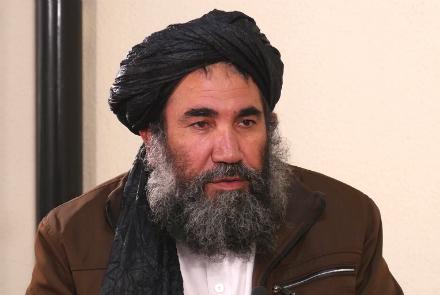As the efforts on finding a solution to the Afghan conflict get momentum at national and international levels, a former senior member of Taliban said there has been “flexibilities” on both sides of the Doha talks, the United States and the Taliban, but according to him the two sides have “different perspectives” on details of the negotiations.
Talking to TOLOnews, Mullah Abdul Salam Zaeef, Taliban’s ambassador to Pakistan during their regime in Kabul, said Taliban is pushing for separate discussions with US officials on “specific” issues around peace, while the United States wants to discuss all issues within a single framework.
“Taliban thinks that if a step is taken with us, then there should be a strong guarantee for it. They (Taliban) want to know that how much strong this step is and what is the scale of support to it from the world. It means that when we (Taliban) are assured that you tell the truth, then we (Taliban) will take the next step. But the US says that no, all issues should be adjusted in a single framework,” Zaeef explained as he talked about the future of the peace talks with the Taliban.
According to US Special Representative for Afghanistan Reconciliation, Zalmay Khalilzad, the United States and Taliban “made progress on vital issues and agreed to agreements in principle on a couple of very important issues”. Khalilzad held six-day talks with Taliban in Qatar last week.
Zaeef said Taliban is thinking about ways that would lead them to peace and that the group “is no longer insisting on victory”.
Giving more details about the talks, Zaeef said Taliban is now adopting a “flexible approach” towards some key topics such as the structure of the future government in Afghanistan and that the group is prepared to see the peace process reaches into a conclusion.
The former member of the Taliban said countries in the region can play a role in the Afghan peace process.
“If I were in Taliban’s position, I would do this long ago to at least acknowledge regional countries so that they should not think that they are our enemies,” he added.
Zaeef noted that the appointment of Mullah Abdul Ghani Baradar as head of Taliban’s political office in Doha is a good sign for the peace process.
“He (Mullah Baradar) has been a military person. This will help that those military men who are against peace will not disrupt the process. It means that all military men without exception have faith in him,” Zaeef said.
Baradar, also known as Mullah Baradar Akhund or Mullah Brother, is a co-founder of the Taliban movement in Afghanistan. He was the deputy of Mullah Mohammed Omar, the founding leader of the Taliban.
Baradar was captured in Pakistan by a team of Pakistan’s intelligence agency, Inter-Services Intelligence (ISI), and US’s Central Intelligence Agency (CIA) officers in February 2010. Baradar was released from a Pakistan prison in October last year.
Zaeef concluded that both the Taliban and the Afghan government need to show some flexibility in the peace process.


